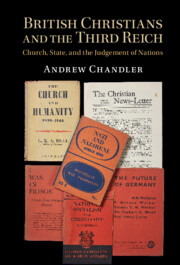Book contents
- British Christians and the Third Reich
- British Christians and the Third Reich
- Copyright page
- Dedication
- Contents
- Acknowledgements
- Introduction
- Part I An Inhabited Landscape
- Part II The German National Revolution, 1933–1934
- Part III Resisting a Rapprochement, 1935–1937
- Part IV Crisis, 1938–1939
- Part V The Onslaught, 1939–1943
- Part VI A Gathering Judgement, 1944–1949
- Endings and Legacies
- Bibliography
- Index
Part IV - Crisis, 1938–1939
Published online by Cambridge University Press: 05 May 2022
- British Christians and the Third Reich
- British Christians and the Third Reich
- Copyright page
- Dedication
- Contents
- Acknowledgements
- Introduction
- Part I An Inhabited Landscape
- Part II The German National Revolution, 1933–1934
- Part III Resisting a Rapprochement, 1935–1937
- Part IV Crisis, 1938–1939
- Part V The Onslaught, 1939–1943
- Part VI A Gathering Judgement, 1944–1949
- Endings and Legacies
- Bibliography
- Index
Summary
In March 1938 independent Austria submitted to a coercive Anschluss with Germany. This union proved to be the fundamental moment in a new period of international crisis. The Third Reich was now a still more formidable power and the determination of its rulers to overturn the map created by the Treaty of Versailles by forceful annexations was manifest. A glance at the new map of central Europe showed how difficult it would be to defend it. Yet the question remained: Was Hitler an imperious revisionist who simply maintained, as had many before him, that Germany and Austria belonged together? In these ways the subsequent Sudeten crisis, only six months later, confirmed and extended arguments which already existed, bringing before the British public an urgent, high political drama in which British policy itself was actively involved. For suddenly they confronted squarely the direct threat of a second European war. Christian opinion assumed a significant and even influential place in what was now an intense discussion of political morality and national self-justification. A modest number of the leading lights of British Christianity were, like Nathaniel Micklem, confirmed pacifists: Henry Carter had made a controversial ‘Personal Confession’ of his views in the Methodist Recorder in March 1933, provoking a great flourish of letters, both hostile and sympathetic. While the Bishop of Birmingham, Ernest Barnes, was the only pacifist bishop of the Church of England, the pacifist position was widely held by a significant, and active, minority of clergy, many of whom had joined the Peace Pledge Union of the charismatic Dick Sheppard. Was war obsolete? What had once seemed a discussion of abstract morality now became vivid and alive with danger, and as the international crisis intensified contrasts between opinions became severe and even unforgiving. When the prospects of peace weakened, and then collapsed, the critics of government policy were not slow to accuse.
- Type
- Chapter
- Information
- British Christians and the Third ReichChurch, State, and the Judgement of Nations, pp. 203 - 270Publisher: Cambridge University PressPrint publication year: 2022



